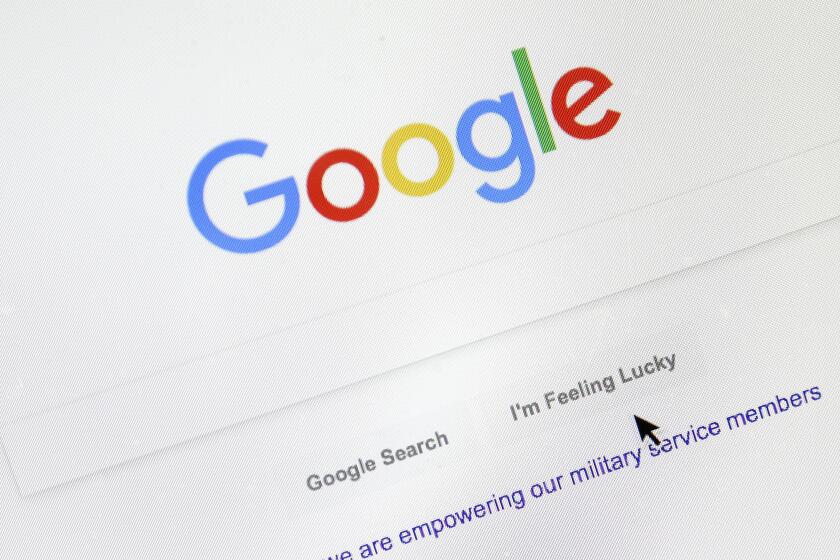
- Share via
- Google’s dominance faces challenges after a federal judge ruled the tech giant illegally maintained a monopoly in search.
- The company plans to appeal the ruling, but the judge is considering potential fixes including a proposal from federal prosecutors that Google be broken up.
- Analysts are skeptical a Google breakup will happen, but expect the Trump administration to tackle antitrust concerns surrounding Big Tech.
SAN FRANCISCO — In its early days, the quirky tech startup known as Google adopted a visionary corporate credo: “Don’t be evil.” That later evolved into the motto: “Do the right thing,” reflecting the idealistic ambitions of the company’s founders that its technology could be a force for good.
Google’s pioneering search technology would transform the internet and its home in Silicon Valley.
But more than two decades later, Google is confronting a starkly different view of its values and conduct, one that has been shaped by federal prosecutors who’ve depicted the tech giant as an “industry behemoth” that has “corrupted legitimate competition.”
“Google is a monopolist, and it has acted as one to maintain its monopoly,” said Amit P. Mehta, a judge of the U.S. District Court for the District of Columbia, in a landmark ruling in August that could reshape the future of search.
The decision represented a big legal blow for one of California’s most successful technology brands, challenging its influence over how people find and consume information online.
Now the Mountain View-based company is at a pivotal point in its nearly 30-year history as it tries to fend off scrutiny over its practices. Among the proposed fixes: The government wants the judge to force Google to sell its Chrome browser and share data with rivals.

“The scope of potential penalty is greater than anything Google has ever faced,” said Damian Rollison, director of market insights at marketing platform SOCi. “It’ll either undermine Google’s ability to maintain its position as the market leader in online advertising … or open up the field to more competition.”
In a major blow to Google, a federal judge on Monday ruled that the tech giant maintained and abused a monopoly on web searches.
The closely watched showdown could have a lasting effect on more than just Google, affecting the government’s attempts to rein in the power of Amazon, Apple and Meta, experts said. Although some analysts are skeptical that Google will be broken up, many expect the incoming Trump administration to tackle antitrust issues.
For its part, Google plans to appeal the ruling and has accused the Department of Justice of pushing a “radical interventionist agenda that would harm Americans and America’s global technology leadership.” The company proposed solutions that would make its contracts with wireless carriers and mobile device makers less restrictive. The judge is expected to hold a trial in April.
Google declined to comment for this article but cited earlier public comments.
Lee-Anne Mulholland, Google’s vice president of regulatory affairs, said in a blog post that the company achieved success through innovating, building the best search engine and making smart business moves, such as investing early in mobile.
“People don’t use Google because they have to — they use it because they want to,” she said.
Meanwhile, Google faces a separate antitrust lawsuit accusing it of monopolizing digital ad technology that publishers and advertisers rely on to make money.
A potentially greater threat comes from emerging artificial intelligence tools such as OpenAI’s ChatGPT search, which can quickly summarize information and could disrupt the way people search and businesses attract new customers.
Google released an AI-powered chatbot called Gemini and includes AI-generated summaries in its search results.
“They’re not going to just ... lie down and let themselves be marched over by these new companies,” Rollison said.
Google faces a new lawsuit in Virginia alleging that the tech behemoth’s dominance of online advertising amounts to a monopoly.
The federal government has stepped in to try to spur more competition and protect consumers when powerful companies grow rapidly and rivals emerge.
In the 1950s, the U.S. government barred AT&T from entering computing business, citing its domination of telecommunications. Three decades later, AT&T agreed to break up “Ma Bell” into smaller independent regional companies.
Then there was Microsoft, which was forced to give up control over the internet after a federal judge ruled in the 2000s that it abused its monopoly power in personal computer operating systems. The judge ordered that Microsoft be broken up, but an appeals court overturned that decision and the software giant agreed to alter its business practices.
“The goal of all of this antitrust enforcement is to have a level playing field and get the best provider of the next technology rather than the last guy,” said Fiona Scott Morton, a professor of economics at Yale University.
The rise of a tech giant
Google got its start in 1995 when founders Larry Page and Sergey Brin met at Stanford University and started building a search engine called Backrub in their dorm rooms.
The duo renamed Backrub to Google, a play on the mathematical term Googol used to describe a large number. Google was founded three years later with a mission “to organize the world’s information and make it universally accessible and useful.”
Like many Silicon Valley startups, Google had humble beginnings. Its first office was a cluttered garage in Menlo Park, Calif., the students rented from the late Susan Wojcicki, who would become the chief executive of Google-owned YouTube.

“They seemed nice. Their idea sounded kind of crazy,” Wojcicki said at a commencement speech in 2014 at Johns Hopkins University.
This quixotic idea eventually ballooned into one of the world’s most valuable and powerful publicly traded tech companies.
From the home, office and everywhere in between, Google’s products became more intertwined with people’s daily lives. Google runs a popular web browser, email, navigation app, news aggregator, virtual assistant and productivity tools that allow people to write, crunch numbers and video chat.
“Google was earning the goodwill of the consumer during that phase of its development by creating these tools and giving them away for free. Not only were they free, but they were the best,” Rollison said. “Eventually you realize ... if the service is free, then it turns out you’re the product.”
Weeks after California announced a $250 million public-private partnership with Google to fund local news outlets and develop AI, many aspects of the deal remain uncertain.
Today, Google’s parent company Alphabet has a market capitalization of more than $2 trillion. It has become an advertising powerhouse, leveraging the trove of valuable data it gathers from people who use Google’s products. The tech colossus has grown even bigger, purchasing valuable platforms including YouTube, Android, Waze, FitBit and DoubleClick.
In the third quarter, Alphabet reported revenue of $88.3 billion, up 15% from the previous year, virtually all of it from Google. Net income rose 34% to $26.3 billion during the period. Alphabet’s stock price has jumped nearly 40% in the last year, closing Friday at $193.13 per share.
“Google’s become a victim of their own success,” said Daniel Ives, a managing director at Wedbush Securities. “They created a product and an algorithm that’s untouchable, and in the views of the Street, they shouldn’t be penalized because they created something that’s changed consumer habits globally.”
Google declared a ‘monopolist’
As Google grew, so did questions about its market dominance.
The U.S. government, eager to curb the power of Big Tech and restore competition, honed in on business tactics Google used to shut out potential rivals. The DOJ and multiple states sued Google in 2020, alleging it illegally operated as a monopoly.
By then, nearly 90% of U.S. search queries went through Google and it was higher on mobile devices, the judge said. Microsoft’s Bing trailed far behind Google, making up roughly 6% of all search queries.
The DOJ alleged in its lawsuit this lack of competition left consumers with fewer choices that could include more benefits such as privacy protections. Advertisers and small businesses also suffered because of higher advertising prices, officials said.
In his nearly 300-page decision, Mehta acknowledges the skilled engineers, innovation and business strategy that propelled Google’s success. But he also points to exclusive agreements struck with Apple, Samsung, AT&T and others to be the default search engine on web browsers and mobile devices, giving Google a “major, largely unseen advantage over its rivals.”
As Google gained users, it drew more advertisers, fueling its revenue growth and making it harder for rivals to compete.
Google’s revenue share payment to Apple, which runs web browser Safari, totaled an estimated $20 billion in 2022, according to the judge’s decision.
Microsoft, which owns and operates the search engine Bing, tried to get Apple to replace Google as the default search engine but it failed, despite offering to share 100% of its Bing revenue with Apple or even sell the search engine, the judge stated.
To Apple, sticking with Google as the default search engine was more of a “sure thing” when it came to revenue sharing, Apple’s senior vice president of services, Eddy Cue, testified in September in a federal court in Washington.
“They have the best search engine, they know how to advertise, and they’re monetizing really well,” Cue said.

Apple estimated it would gain about $40 billion from Google in the next five years if it continued its agreement — much higher than the $20 billion Microsoft would pay Apple over five years.
Ultimately, the judge ruled that Google violated federal antitrust law by maintaining a monopoly in general search services.
Google has disputed the claim.
“Since the trial ended over a year ago, AI has already rapidly reshaped the industry, with new entrants and new ways of finding information, making it even more competitive,” Mulholland wrote in a blog post.
The court ruling could give a significant boost to DuckDuckGo, which was founded in 2008 by Gabriel Weinberg in a basement outside Philadelphia. He wanted to create a rival search engine that would have fewer ads and not collect any user data.
“It could signal the beginning of a new era in search,” said Kamyl Bazbaz, senior vice president of public affairs for DuckDuckGo. “The government proposed a comprehensive package of remedies that is meant to unravel the overlapping grip that Google has had on the search market for more than a decade.”
Many news outlets are already dealing with declining revenue from digital ads and subscriptions. Now, their business models are poised to be disrupted again by AI.
A battle with publishers
Rival search engines aren’t the only ones hoping to benefit from the possible breakup of Google.
Danielle Coffey, president and chief executive of the News/Media Alliance, a nonprofit representing media organizations, contends Google has abused its power at the expense of content creators, changing how their websites rank in search results and giving them less money.
“We just want a fair shot at monetizing that content,” she said. “Right now, our distributor is reaping all the benefit, and they’re allowed to because of their size.”
As Google became the dominant search engine, news publishers increasingly relinquished control to the tech giant to drive traffic to their websites.

And as Google captured more online advertising dollars, publishers worried they weren’t being compensated enough for their content. They have endured massive layoffs and budget cuts.
The separate 2023 lawsuit filed by the DOJ, which a judge hasn’t ruled on yet, accuses Google of monopolizing digital ad technologies and harming online publishers and advertisers that rely on these tools. This allegedly included buying rivals such as ad company DoubleClick and forcing publishers to use its tools.
Google has countered in blog posts that the ad tech industry is competitive, publishers and advertisers have control over how ads are bought and sold, and ad buyers and sellers use their tools because they’re simple, affordable and effective.
The company’s influence over the news industry attracted the attention of California lawmakers who proposed a bill that would have required Google to pay news outlets for distributing their content.
Google said it will remove links to California news sites for some users because of concerns about a state bill that may require Google to pay publishers.
But Google aggressively lobbied against the bill, known as the California Journalism Preservation Act, in the summer.
“It was very hard to pass this legislation in Google’s backyard,” Julie Makinen, chair of the California News Publishers Assn., the bill’s lead sponsor, said last year, noting Gov. Gavin Newsom’s long-standing ties to the company’s founders. A Newsom representative disputed the claim, saying the governor had worked to balance imposing regulations with encouraging innovation.
The Los Angeles Times, which supported the bill, is a member of the News/Media Alliance and the California News Publishers Assn. Makinen also worked at the newspaper as a former editor and reporter.
Google said it helps drive traffic to publishers and the bill would have put “small publishers at a disadvantage and limit consumers’ access to a diverse local media ecosystem.” It has also argued that it supports journalism in other ways, such as the Google News Initiative, which provides funding, resources and training.
In August, California lawmakers agreed to shelve the bill after striking a controversial and nonbinding deal with Google and a news industry trade group to fund newsrooms. Google, taxpayers and other private donors would contribute nearly $250 million over five years to fund news outlets and an “AI accelerator” so journalists could experiment with the technology.
While AI can help journalists with tedious tasks such as analyzing data and transcribing interviews, reporters fear these tools could generate false information or eliminate jobs.
Google funded advertising against legislation that would require large tech platforms to pay news publishers.
Additionally, news publishers are concerned AI used to summarize news articles in Google search results could cause traffic to plummet because people might not click through to their websites. The DOJ has suggested publishers should be allowed to opt out of having their content displayed as AI-generated content or used to train AI models capable of summarizing text.
The Trump effect
It’s unclear what President-elect Donald Trump’s return to the White House will mean for antitrust enforcement. Trump has signaled he’s wary about breaking up Google, but has also been critical of Big Tech.
“It’s a very dangerous thing because we want to have great companies — we don’t want China to have these companies,” he said in an interview with Bloomberg in October. “Right now, China is afraid of Google.”
Trump’s views on artificial intelligence, cryptocurrency, electric vehicles and other issues could reshape the tech industry.
William Kovacic, a George Washington University law professor and former Federal Trade Commission chairman, said Democrats and Republicans are skeptical of powerful tech companies for different reasons. Republicans such as Trump have accused Google of suppressing conservative speech and being politically biased, which it has denied.
Moreover, it was under the Trump administration that the DOJ sued Google, Kovacic noted.
“In many ways,” Kovacic said, “it’s in the judges’ hands now, but I don’t see the Justice Department backing off.”
Times researcher Scott Wilson contributed to this report.
More to Read
Inside the business of entertainment
The Wide Shot brings you news, analysis and insights on everything from streaming wars to production — and what it all means for the future.
You may occasionally receive promotional content from the Los Angeles Times.



















